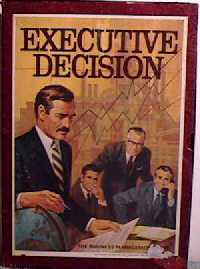 EXECUTIVE DECISION
EXECUTIVE DECISIONEXECUTIVE DECISION is another one of those games that looks very simple on the surface, but reveals surprising depth when played. Like most of Sackson's games, the rules are brief. When I first got this game, I read them and thought that the game would probably take about 20 minutes to play. Much to my surprise, I found that it took almost two hours.
EXECUTIVE DECISION is a game about the basic law of economics having to do with supply and demand. You are in the manufacturing business. Every month, you must first obtain raw materials, and then sell the finished goods you've made with them. After twelve months, the player with the most money wins the game.
There are three grades of raw materials: Standard, Fine, and X-Fine. And there are three types of finished goods: A, B, and C. Finished good A is made from two X-Fines and one Fine. Finished good B is made from one X-Fine, one Fine, and one Standard. Finished good C is made from one Fine and two Standards.
Here's where the game gets interesting. At the start of each turn, the players put in their bids for the raw materials they want. They put down how many units of each they want, and how much they're willing to pay. All players reveal their bids simultaneously, and the price fluctuates depending on how many of each was ordered. If your bid wasn't high enough to cover the newly adjusted price, you don't get to buy that material that month. Then again, if your bid was too high, you have to pay your bid price regardless.
The second half of each turn consists of production. Each player writes down how many of each finished product he can manufacture, and the selling price he's willing to sell them for. After the bids are revealed, supply and demand again adjusts the price. If there are too many units of a given finished product being sold that month, the price goes down. And, obviously, if there are only a few of any given product, the price goes up. If the price goes down below what the player was willing to accept for the goods, he doesn't get to sell them. This can be devastating, as he may need that money in order to buy more raw materials for the next month's production! If the price goes higher than his bid, he must still sell it for his bid price.
And that's really about all there is to it. Sounds simple? Guess again. You're constantly looking over at the other players' inventories, trying to second-guess them. It's also possible to put in bids for large quantities of raw materials to drive the price up with no intention of actually buying, just to raise the price for your competitors. (You are, however, limited to how many units you can bid on per month.) It's fiendishly challenging, and totally engrossing.
Click to see if Funagain has EXECUTIVE DECISION.